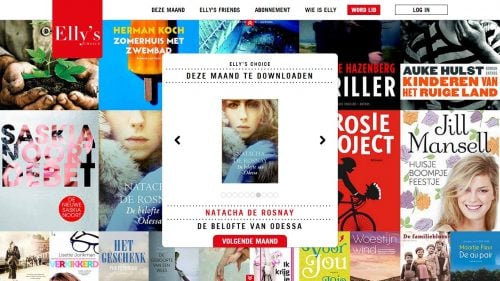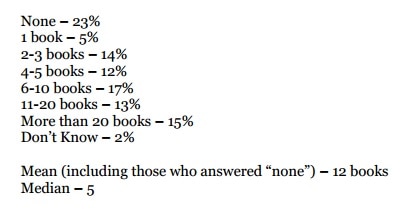The Digital Reader |
- Elly’s Choice Offers a New Book Club Style eBook Subscription Service in the Netherlands
- Book Riot’s Great Audiobook Survey Reveals Listening Habits Radically Different from Reading Habits
- Kobo’s Tamblyn: “Our most valuable customers are people who read on both an e-ink device and on a third party device”
- Audible for iPad and iPhone Updated with New Discover Section, 30-Second Forward Button
- The Morning Coffee – 27 August 2014
- Will Amazon Turn Twitch Into A Failure like GoodReads? One Can Only Hope
| Elly’s Choice Offers a New Book Club Style eBook Subscription Service in the Netherlands Posted: 27 Aug 2014 12:30 PM PDT
Elly’s Choice offers a simple and cheap subscription plan that costs 3 euros per month for 10 ebooks – with a catch. On the downside, subscribers can only get the 10 titles offered in a given month, but on the upside they do get all 10 titles as DRM-free Epub for only 3 euros a month. (Technically the ebooks have digital watermarks, but that is close enough to be splitting hairs.) I’m told the books are a mix of backlist and former best sellers, but since they are in Dutch I can’t confirm that detail. But I have been told that the titles for the first monthly bundle were provided by VBK Media, one of the larger Dutch publishing houses. You can find more information on the Elly’s Choice website. Elly’s Choice is in many ways similar to Entitle, a US based startup, but I don’t think they have the same business model. Entitle offers a 2 ebook per month plan for $15, while Elly’s Choice charges only 3 euros. The radical price difference suggests that Elly’s Choice pitches itself to publishers as a marketing and promotion service, and bills the publishers. This is very similar to services like BookBub, which charges authors and publishers for the privilege of being included in a daily email blast. The post Elly’s Choice Offers a New Book Club Style eBook Subscription Service in the Netherlands appeared first on The Digital Reader. |
| Book Riot’s Great Audiobook Survey Reveals Listening Habits Radically Different from Reading Habits Posted: 27 Aug 2014 11:14 AM PDT
A couple days ago Book Riot released the results of their latest Great Audiobook Survey, and it shows that the listening public differs significantly from the reading public. Based on a pool of 1030 voluntary responses, the survey told us a few expected details like digital audiobooks being the dominant format (75%), or that listeners get their audiobooks from the library (48.7%) and from Audible (35%), but it also revealed a few surprising details about the number of audiobooks that the respondents consumed in the past year. The vast majority of respondents (96.4%) had listened to an audiobook at some point, and nearly as many (89.7%) had listened to one in the past year. The respondents reported listening to an average of 17.5 audiobooks per year, but the distribution of titles per listener was different from what I had expected. Here’s what the Pew Research Center reported in their latest survey. I don’t have a chart, but as you can see the number of books read is not terribly inconsistent across the categories: Just to put this into perspective, PRC also reported that 19% of the 77% who had read a book had listened to an audiobook( ~ 14.6%). I’m pointing that out specifically because the data from Book Riot shows that their respondents were concentrated among the heavy readers/listeners: The average audiobook listener consumes far more audiobooks than the average reader. In some ways this isn’t a surprise, given that you can listen to an audiobook in situations where you cannot read a book, but it is still interesting to see that audiobook listeners are showing the same propensity as ebook readers to be heavy consumers of books in one form or another. A recent Harris Poll (and past anecdotal reports) showed that people who read ebooks consumed more than those who did not. This comes as no surprise, just like the dominance of digital audiobooks comes as no surprise. Heavy readers switched to ebooks because of the convenience of carrying around many books at once in a minimal space, and the same convenience factor applies to audiobooks as well (even though the file sizes are significantly larger). But what I find most interesting about the Book Riot survey is what it says about market data. According to the AAP, audiobooks accounted for less than a tenth as many sales in 2013 as ebooks. That suggests that listeners are borrowing more than buying. The post Book Riot’s Great Audiobook Survey Reveals Listening Habits Radically Different from Reading Habits appeared first on The Digital Reader. |
| Posted: 27 Aug 2014 07:17 AM PDT
Categories like premium ereader hardware, for example. In an interview with the Telegraph, Kobo president and chief content officer Michael Tamblyn, explained why this small Toronto-based ebook company has released not one but two premium devices, including last year’s Aura HD and the Aura H2O which was announced yesterday. “We look at Aura HD as being similar to that music fan who has just bought a £170 set of headphones,” he said. “It's a case of, here is this thing that I love more than anything else, how can I make sure it's as good as it can possibly be?” The Aura HD, which launched last year, is indeed a premium device. It sports a 6.8″ display with a screen resolution which is unmatched among ereaders. When it launched last year, the unexpectedly tapped into a market segment which even Kobo underestimated. While they expected that the Aura HD make up 5% of sales, it soon accounted for 25% of hardware sales. “People who are especially passionate about a particular segment of media are willing to invest in the best possible experience of that media. So someone who is passionate about music will have invested in the best set of headphones they can possibly get,” Tamblyn said. In retrospect it makes sense, but given the general decline in ereader sales over the past few years, releasing a premium device was a gamble – one which B&N may have passed on. There were rumors last year that Kobo swooped in and took advantage of Barnes & Noble cancelling a 6.8″ Nook. That rumor was never confirmed, but after I held the Aura HD I thought it was true. In fact, one might conclude from Kobo’s calling the Aura HD a “limited edition” when it launched that not even Kobo was certain that it would prove popular enough to keep it in production But clearly Kobo has identified a market segment that wasn’t being addressed by their competitor. “Our most valuable customers are people who read on both an e-ink device and on a third party device that they also own. The e-ink device is what they have by the bedside, but they'll also pull a smartphone out when they're waiting in a line at the bank, and open up an app that picks up at the same point that they set it down at home.”
The post Kobo’s Tamblyn: “Our most valuable customers are people who read on both an e-ink device and on a third party device” appeared first on The Digital Reader. |
| Audible for iPad and iPhone Updated with New Discover Section, 30-Second Forward Button Posted: 27 Aug 2014 06:04 AM PDT
The audible app now features a new discover section which offers a bevy of titles you might want to buy and listen to, and Audible has also improved the search function, enabling listeners to get more info on their next audiobook. There’s also a new fast forward button which lets listeners jump 30 seconds ahead, making it easier for them to skim an audiobook and find the section that interests them. And then there’s the new app theme. Audible has swapped out the existing black/ orange theme (on the left) for a white, lighter, and flatter theme which more closely fits with iOS7. I for one don’t care about the holy flat vs skeuomorphic debate, but the lighter colors are more pleasing on the eye, is it not? The app is free in iTunes. The post Audible for iPad and iPhone Updated with New Discover Section, 30-Second Forward Button appeared first on The Digital Reader. |
| The Morning Coffee – 27 August 2014 Posted: 26 Aug 2014 08:04 PM PDT The reading list this Wednesday morning is not terribly long but it does include stories worth reading, like a critique of Laura Miller’s flawed anti-Amazon article in Salon, and more.
The post The Morning Coffee – 27 August 2014 appeared first on The Digital Reader. |
| Will Amazon Turn Twitch Into A Failure like GoodReads? One Can Only Hope Posted: 26 Aug 2014 03:06 PM PDT
Earlier today I read a post on ReadWrite which asked whether Twitch would end up being a failure like Goodreads:
ReadWrite is referring to a policy change which was made last year. Goodreads decided to ban a certain type of book review, namely ones which focused on an author’s behavior. Goodreads then, without warning or notice, went through existing reviews and deleted any reviews which violated the policy. I disagreed with both the policy and its execution, but Goodreads’s subsequent growth has shown that it was not necessarily the wrong decision. To call the social network a failure based on that one event is simply ridiculous. I initially planned to simply tweet a comment about that ReadWrite piece, but after that tweet drew a response from Goodreads founder Otis Chandler I realized that there was a bigger story here. In all honesty, if Twitch “failed” as thoroughly as Goodreads then it will become a great online community that everyone in gaming will benefit from. I’m being ironic, but for the moment let’s consider what would happen if Amazon enacted a policy change on Twitch similar to the one that occurred on Goodreads last year. That policy was defended by some as a way of protecting authors from trollish Goodreads users. If Twitch made a similar “mistake” they would be enacting an active policy against sexual harassment and misogyny. To be fair, Twitch already has a harassment policy and doesn’t appear to have a serious issue with misogyny (or so Google suggests), but as an outsider I do not know if that is a sign that there is no problem or if it indicates that female gamers are avoiding the community or hiding their gender. As the attacks on Anita Sarkeesian have made abundantly clear, gaming has a problem with sexual harassment. This is even a problem on twitch, apparently. This problem might be confined to a handful of malicious trolls, but they’re ruining it for the rest of us. If Amazon forced Twitch to adopt a policy of “censoring” trolls, I really do not see how that would be bad. Given that women over 18 account for a larger share of gamers than teen boys, I do not see how that new policy would doom Twitch. I think a messy public policy change which made Twitch friendlier to female gamers would likely make the community more appealing, not less. I might not be the subject of the abuse but even I don’t like being around that type of person. I, for one, would love to see Twitch “fail” as completely as Goodreads. That would be awesome. Who’s with me? The post Will Amazon Turn Twitch Into A Failure like GoodReads? One Can Only Hope appeared first on The Digital Reader. |
| You are subscribed to email updates from The Digital Reader To stop receiving these emails, you may unsubscribe now. | Email delivery powered by Google |
| Google Inc., 20 West Kinzie, Chicago IL USA 60610 | |


![audiobooks-average-1024x928[1]](http://the-digital-reader.com/wp-content/uploads/2014/08/audiobooks-average-1024x9281-150x135.jpg)

![Audiobook-listening-frequency-without-outliers[1]](http://the-digital-reader.com/wp-content/uploads/2014/08/Audiobook-listening-frequency-without-outliers1-500x309.png)
![exec_miketamblyn3[1]](http://the-digital-reader.com/wp-content/uploads/2014/08/exec_miketamblyn31.jpg)

![audible1[1]](http://the-digital-reader.com/wp-content/uploads/2014/08/audible11-500x437.jpg)

No comments:
Post a Comment